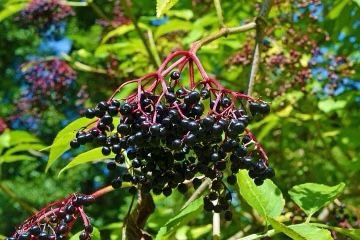Elderberry: The Ultimate Immune Tonic
We should be all be taking Elderberry throughout the cold season due to its abundance of antiviral properties. Recent research is confirming the numerous reasons why berries have been known as a “cure all” in the past.
The sample of research that I’ve compiled below illustrates in a more scientific framework, for those interested, the discoveries proving the beneficial effects that elderberries have on our bodies.
Elderberries are packed with nutrients and antioxidants which help us maintain a healthy immune system, as well as regulating blood pressure and blood sugar levels. They also protect arteries from inflammation, reduce oxidative damage, improve mitochondrial function, not to mention elderberries antiviral and antibacterial properties.
Elderberries must be cooked before consumption (raw berries are poisonous) and are best taken as a syrup, glycerite, or tincture.
Elder, Sambucus nigra, is a plant that has been at the heart of European herbal medicine since pre-history with proof of usage dating back millennia.
Hippocrates called Elder “nature’s medicine chest”, and Charlemagne, who united majority of Western Europe in 9th century, decreed that an Elder be planted in every yard in his realm “as a medicine cabinet”.
Elderberries have been used ever-since by European medical doctors and common folk alike.
.
Elderberries have been used ever-since by European medical doctors and common folk alike. Today Elder still presents as one of the most used medicinal plants worldwide, a testament to this plants pharmacological properties.
RESEARCH
There are an ever-growing numbers of research papers published on the physiological actions of elderberries.
ANTIVIRAL AND IMMUNE TONIC
The research on the therapeutic actions of elderberries has been primarily focused on its antiviral and anti-inflammatory processes (cytokine regulation). Research in vitro (Roschek et al., 2009) has shown that elderberry inhibits Human Influenza A virus (H1N1). It can be assumed that flavonoids in elderberry bind to the surface of H1N1 and thus block the viruses’ ability to infect host cells (Roschek et al., 2009).
Research into the immunomodulating properties of elderberries isolated the immunomodulating polysaccharides and the pectic polymers. The results showed elderberry had potent macrophage stimulating as well as complement fixating activity (Ho et al., 2015).
A NUTRIENT POWERHOUSE
Elderberries exhibit high amounts of biologically active molecules with a wide spectrum of effects, from antioxidative and phytoestrogenic polyphenols to toxic glycosides and aldehydes. It is the presence of these molecules that explains their physiological and therapeutic effects (Kolesarova et al., 2022).
Ripe elderberries are rich in beneficial nutrients associated with their therapeutic properties: carbohydrates, proteins (all sixteen amino acids), fats, fatty acids, organic acids, minerals, vitamins and essential oils. They contain components which have high biological activity such as primarily: polyphenols, known for their antioxidant activity. However, they also contain anthocyanins, flavonols (quercetin, kaempferol, rutin), phenolic acids, proanthocyanins, as well as terpenes and lectins (Kolesarova et al.,2022).
AN ANTIOXIDANT
Elderberries also have one of the highest antioxidant actions of small fruits. Polyphenols are powerful antioxidants that work to counteract the oxidative stress induced damage that occurs in the body. They help maintain a healthy immune system, regulate blood pressure and blood sugar levels, and protect the arteries from inflammation and damage (McIntyre, 2021).
The polyphenol content in elderberries has been proven to be high compared to other fruits, including similar dark berries and tree berries (Sikora et al.:Leja et al., 2007).
Anthocyanins are responsible for giving the fruit its characteristic black-purple colour (Anton et al., 2013; Christensen et al, 2008). The major anthocyanins are cyanidin-3-glucoside and cyanidin-3-sambubioside. Elderberry derived anthocyanins appear in the blood and urine fairly quickly in low amounts, which indicates their metabolism before the absorption (Netzel et al., 2005).
Studies suggest elderberry components have a markedly beneficial effect on blood pressure, reduce oxidative stress, and increase the activity of antioxidant enzymes in the blood plasma (including glutathione). Additionaly, they lead to the reduction of uric acid levels (Badescu et al.,2012; Ciocoiu et al., 2009; Ciocoiu et al., 2016; Badescu et al., 2014; Moroşanu et al., 2011).
A study using an anthocyanin-enriched elderberry extract evaluated its potential to target oxidative stress and mitochondrial dysfunction. These are both early pathological events detected in neurodegenerative diseases. The findings show remarkable antioxidant activity and an affinity for mitochondrial membranes. Most importantly activity was noted, relating to mitochondria functionality modulation, with high relevance to neurodegenerative diseases (Ho et al., 2015).
ANTINFLAMATORY
Elderberries’ anti-inflammatory actions improve inflammatory problems, such as gout and arthritis, as well as regulating uric acid levels, which is beneficial for both gout and high blood pressure (McIntyre, 2021; Blochwich, 1677; Jacobs, 2010).
Elderberries also have an exceptional fatty acid profile which on consumption would support cardiovascular health. They have a high content of linoleic (39%) and linolenic acids (38%), as well as polyunsaturated fatty acids (omega-3: 38g/100 g and omega-6: 39g/100 g fatty acids). This could contribute to cholesterol and triglyceride levels regulation (McIntyre, 2021; Dominguez et al., 2020).
Elderberries are also researched because of their plethora of other properties and the associated cures they could be involved in. These promising features include: antioxidant, anticarcinogenic, antiallergic, antiviral, antibacterial, antidepressant, and hypoglycemic properties. Their ability to reduce blood lipid concentrations and body fat is another property that is of great interest to the scientific community, due to its widespread consumerist applications (Młynarczyk et al., 2018; Oniszczuk et al., 2019; Vlachojannis et al., 2009).
